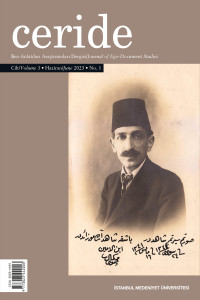Abstract
The letters, which reflect the relations of Mustafa Kemal Pasha, who had been separated from his mother Zübeyde Hanım and sister Makbule Hanım since his early youth, with his family and the fact that his care and protection were never withheld from them, reflect sincere feelings and thoughts far from the formal structure of official documents in family correspondence, and carry elements of original self-narrative. At the same time, the fact that Mustafa Kemal Pasha cared for orphaned children who had a promising future through his family, which was an unknown aspect of Mustafa Kemal Pasha, is also understood between the lines in the letters.
The letters constitute examples of texts that touch upon the humanitarian aspect as well as the statesmanship of Mustafa Kemal Atatürk, whose family relations and humanitarian aspect we witnessed despite all the preoccupations of the young Republic of Turkey, where he led the nation in the most difficult years of the empire and assumed the founding Presidency.
In addition to these intra-family letters, the letter of Ali Emiri Efendi, the founder of the Millet Library and one of the most important cultural bridge figures of the transition from the Ottoman Empire to the Republic, in which he describes the adventure of the establishment of the Millet Library in a letter of concession and request, is a remarkable example both in terms of our cultural history and in terms of the self-narrative elements it contains.
Abstract
Erken gençlik yıllarından itibaren annesi Zübeyde Hanım ve kız kardeşi Makbule Hanım'dan ayrı kalmış olan Mustafa Kemal Paşa'nın ailesiyle olan ilişkilerine, ilgi ve korumasının onların üzerinden hiç esirgenmediğine ait satırların yansıdığı aile içi yazışmalarda resmi belgelerin formel yapısından uzak, samimi duygu ve düşüncelerin yansıdığı mektuplar orijinal ben anlatısı unsurları taşımaktadır. Aynı zamanda Mustafa Kemal Paşa'nın çok bilinmeyen bir yönüne ailesi vasıtasıyla gelecek vadeden kimsesiz çocuklara sahip çıkışı da mektuplardaki satır aralarından anlaşılmaktadır.
Mektuplar, imparatorluğun en zor yıllarında millete önderlik ederek kurucu Cumhurbaşkanlığını üstlendiği genç Türkiye Cumhuriyeti'nin tüm meşguliyet alanlarına rağmen aile içi münasebetlerine ve insanî yönüne şahit olduğumuz Mustafa Kemal Atatürk'ün devlet adamlığı yanı sıra insani yönüne temas eden metin örneklerini oluşturmaktadır.
Bu aile içi mektupların yanısıra Millet Kütüphanesinin kurucusu olan ve Osmanlı'dan Cumhuriyete geçişin kültür köprüsü şahsiyetlerinin en önemlilerinden biri olan Ali Emiri Efendi'nin aslında bir tavassut ve rica mektubunda Millet Kütüphanesinin kurulma serencamını anlattığı mektubu hem kültür tarihimiz bakımından hem de içerdiği ben anlatısı unsurları bakımından dikkat çekici bir örnektir.
Details
| Primary Language | Turkish |
|---|---|
| Subjects | Biography |
| Journal Section | An Ego-Document from the Ottoman Archives |
| Translators | |
| Publication Date | June 30, 2025 |
| Submission Date | January 24, 2025 |
| Acceptance Date | June 12, 2025 |
| Published in Issue | Year 2025 Volume: 3 Issue: 1 |


